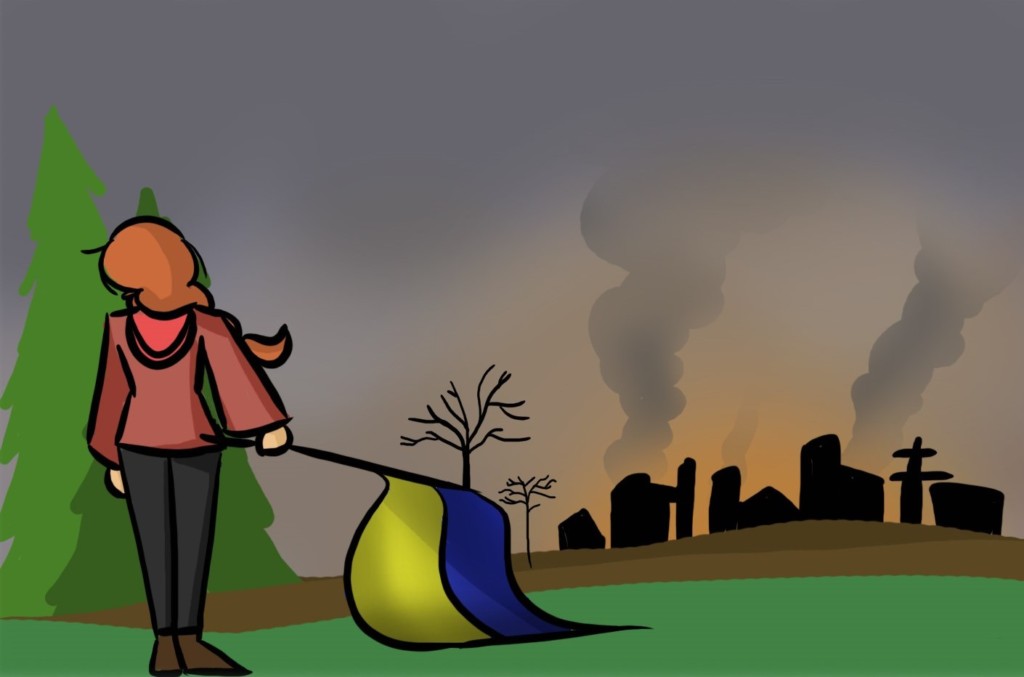
I suspect that Putin wanted to scare Europe into obedience and caution by showing his wraith in Ukraine. Instead, it seems he has crushed his economy and mobilized his opponents to militarily prepare themselves for further confrontation.
Military budgets go up while NATO membership looks all the more appealing
By Matthew Fraser, Editor in Chief
All across Europe, the shockwaves of the Russian invasion of Ukraine are being felt. In some cases the shockwaves have been mostly contained to the news media and increased day-to-day speculation; in other cases, the effects have manifested themselves in a change towards military spending and other parts of government policy.
Global News recently published an article featuring interviews with people in Latvia. The small North-Eastern country was formerly part of the Soviet Union however, just before the Union collapsed Latvia received its independence. One woman described the tension between her and her father who supported the invasion as being so severe that she could barely talk with him about it. Likewise, an elderly woman went so far as to tell reporters that the Ukrainians were “much more to blame” for the invasion than not.
Aurel Braun, a political science professor at the University of Toronto, describes the separation between the older generation and the new generation as part of a historic view. He says: “It’s a nostalgia for something that never really existed, but it existed in their [the older generations] mind.” And though some members of the older generation remember their childhood as a better time than the present, the opinion has not been carried on to their children and is certainly not shared across Europe.
In the case of Finland which was once invaded by Russia, the time has come to seriously consider joining NATO. According to polling reported by the Atlantic Council, a slim majority of Finns now support joining NATO while just next door in Sweden, 41 percent of Swedes now favour NATO membership. Should Finland formerly join NATO, the encirclement that Putin has long feared may creep back to the fore. In a sense, he will have gifted himself the very thing that he has most feared. And in some way, his threatening and hostile tactics have actually worsened and emboldened the movements he has hoped to dissuade.
As a result of the crisis erupting on its Ukrainian border, Poland has chosen to increase its military budget. Despite sharing a border with Russia, Poland is already a Nato country and is not reacting kindly to the violence Russia has enacted on its neighbour. According to Reuters, Jaroslaw Kaczynski, the leader of the ruling nationalist Law and Justice party stated: “There will be an amendment [to the defence plan]: 3% of GDP on defence next year, then we will increase it.” The Polish Government also intends to more than double its troop count from 143,500 to 300,000.
In Denmark, the invasion has prompted a boost in defence spending. Reuters reported that Denmark would significantly increase its defensive budget but also begin weaning itself off of Russian natural gas. Denmark’s new defence spending goal is 2 percent of GDP up from the 2019 level of 1.35 percent. To accommodate these spending goals, Denmark has indicated that it is willing to run a national deficit by 2025. Yet it is not alone in its plans for higher defensive spending.
Sky News reported that the UK was likely to increase its defensive spending in the upcoming weeks in announcements that would cover the lethal aid sent to Ukraine and potential increases in other areas as well. This is in addition to an earlier 24 billion pound increase in defence spending. These announcements dovetail closely with statements from Scottish National Party member Stewart McDonald who referred to previous UK defence cuts as “short-sighted.” As reported in The Scotsman, McDonald also criticized a personnel reduction by saying: “They’re still going to cut the army by 10,000 troops. I don’t think that’s big or clever.”
However, the change of the greatest magnitude has come after Germany made a blistering about-face following Russian troops violating Ukrainian sovereignty. As Vox reports, Germany went from blocking other NATO countries from sending its armaments to aid Ukraine and only sending helmets and a field hospital to sending 1,000 anti-tank weapons and 500 stinger missiles to Ukraine. Not only that, the country erased its previous reluctance to spend on its domestic military and committed to spending more than two percent of the nation’s GDP on its military. Like other European nations, Germany has also promised to move away from Russian energy dependence.
I suspect that Putin wanted to scare Europe into obedience and caution by showing his wraith in Ukraine. Instead, it seems he has crushed his economy and mobilized his opponents to militarily prepare themselves for further confrontation. It is unlikely if not impossible that the near-term future of Russian-European relations will be favourable to Putin. Save for some of the older generations of Russian-speaking nationals of former Soviet Union nations, everyone is terrified of the consequences of being ill-prepared and hostile towards the Russian bear next door. Only time will tell how much this misstep will cost Putin.



